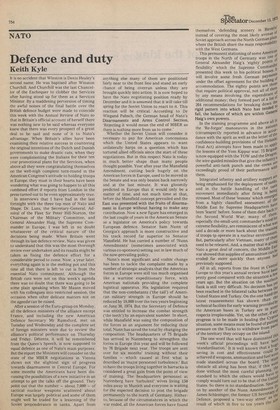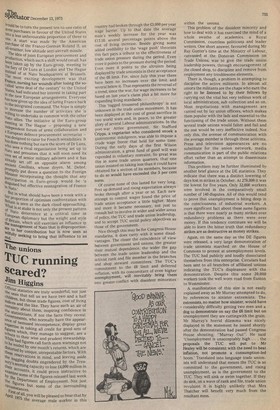Defence and duty
Keith Kyle
It is no accident that Winston is Denis Healey's second name. He was baptised after Winston Churchill. And Churchill was the last Chancellor of the Exchequer to clobber the Services after having stood up for them as a Services Minister. By a maddening perversion of timing the awful noises of the final battle over the British defence budget were made to coincide this week with the Annual Review of Nato so that in Britain's official account of herself there was nothing new to be said whereas everyone knew that there was every prospect of a great deal to be said and none of it to Nato's advantage. When Britain's allies have been examining their relative success in countering the original intentions of the Dutch and Danish governments to make drastic cuts, when they were complimenting the Italians for their ten year promotional plans for the Services, when above all they were congratulating themselves on the well-nigh complete turn-round in the American Congress's attitude to holding troops in Europe, they must in their hearts have been wondering what was going to happen to all this combined effort if reports from London in the press turned out to be even approximately true.
In interviews that I have had in the last fortnight with the three top men of Nato and Shape, Dr. Luns, the Secretary-General, Admiral of the Fleet Sir Peter Hill-Norton, the Chairman of the Military Committee, and General Alexander Haig, the Supreme Commander in Europe, I was left in no doubt whatsoever of the critical nature of the decisions being made. When Britain went through its last defence review, Nato was given to understand that this was the most thorough review ever undertaken and its results might be taken as fixing the defence effort for a considerable period to come. Now, a year later, everything again is in the melting pot and this time all that there is left to cut is from the essential Nato commitment. Although the British cuts were not on this week's agenda there was no doubt that there was going to be some plain speaking when Mr Mason moved with his colleagues into restricted session, the occasion when other delicate matters not on the agenda-can be raised.
After a session of the Euro-group on Monday, all the defence ministers of the alliance except France, and including the new American Defence Secretary Mr Rumsford, met on Tuesday and Wednesday and the complete set of foreign ministers were due to review the alliance's political performance on Thursday and Friday. Detente, it will be remembered from the Queen's Speech, is now supposed to equal defence as one of Nato's main purposes. But the report the Ministers will consider on the state of the MBER negotiations in Vienna shows not the slightest sign of progress towards disarmament in Central Europe. For some months the Americans have been discussing the possibilities of a new initiative in an attempt to get the talks off the ground. They point out that the number — about 7,000 — of tactical nuclear weapons scattered about Europe was largely political and some of them might well be traded for a lessening of the Soviet preponderance in tanks. Apart from anything else many of them are positioned fairly near to the front line and stand an early chance of being overrun unless they are brought quickly into action. It is now hoped to have the Nato negotiating position ready by December and it is assumed that it will take till spring for the Soviet Union to react to it. This reaction will be critical. According to Dr VViegand Pabsch, the German head of Nato's Disarmaments and Arms Control Section, 'Rejecting it would mean the end of MBER as there is nothing more from us to come.'
Whether the Soviet Union will consider it necessary to pay for American concessions which the United States appears to want unilaterally harps on a question which has tortured allied officials since the start of these negotiations. But in this respect Nato is today in much better shape than many people thought possible. Year after year the Mansfield Amendment, cutting back hugely on the American forces in Europe, used to be moved in the Senate and was only beaten back narrowly and at the last minute. It was gloomily predicted in Europe that it would only be a matter of time, and not much time at that, before the Mansfield concept prevailed and the East was presented with the fruits of disarmament in Europe without haying to make any contribution_ Now a new figure has emerged in the last couple of years in the American Senate as a legislator on America's policy towards European defence. Senator Sam Nunn of Georgia's approach is more constructive and his track record far superior to Senator Mansfield. He has carried a number of 'Nunn Amendments' (sometimes associated with various co-sponsors) setting out in law much of the now-prevailing policy.
Nunn's most significant and visible change has been to tackle the complaint made by a number of strategic analysts that the American forces in Europe were still too much organised like a wartime expeditionary force, with American nationals providing the complete logistical apparatus. His legislation required that the non-combatants (the tail') of American military strength in Europe should be reduced by 18,000 over the two years beginning on June 30, 1974. But the Secretary of Defence was entitled to increase the combat strength ('the teeth') by an equivalent number. In short, while Mansfield was using the composition of the forces as an argument for reducing their total, Nunn has saved the total by changing the composition. The headquarters of 75 Brigade has arrived in Nuremberg to strengthen the forces in Europe this year and will be followed by 76 Brigade next year. The troops are sent over for six months' training without their families — which caused at first what is described as 'major personnel turbulence.' But to have the troops living together in barracks is considered a great gain from the point of view of training. The headquarters personnel at Nuremberg have 'turbulent' wives living 150 miles away in Munich and everyone is waiting for the expected decision to post the brigade permanently to the north of Germany. Hitherto, because of the circumstances in which the war ended, all the American forces have found
Spectator December 13, 1975 All in all, reports from the front in Central themselves 'defending scenery in Bavaria, instead of covering the most likely avenue el Soviet approach across the North German Plant where the British share the main responsibilitli with the West Germans. This permanent stationing of some American troops in the North of Germany was one or General Alexander Haig's 'eighty Points a' flexibility' which the Supreme Commander presented this week to his political bosses. It will involve some fresh German PaYrrleti,,t5/ under the offset agreement for the building accommodation. The eighty points are Ulnae that require political approval, not all of the°, by any means involving the expenditure e,' additional money; they formed part of a list el 264 recommendations for breaking down tir,, rigid pattern into which Nato has tended fall, the balance of which are within Genera Haig's own powers. In the training programme and above all the 'Re-forger' manoeuvres in the auturarli (circumspectly reported in advance in acc% dance with the spirit as well as the letter of confidence-building provisions of the Helsiru‘l Final Act) attempts have been made to ael)131 the lessons of the Yom Kippur war. 75 Brigade is now equipped with the TOW and the Dragon,: the wire-guided missiles that give the infantrY: powerful anti-tank punch and the crews aril exceedingly proud of their performance Wit re Integrated infantry and artillery supPort being emphasised for the deployment of and in the battle handling of the tan movement immediately after firing is be,,itle! stressed. Most of these 'lessons' which erner6,,,e from a highly classified assessment of we Middle East by Supreme Headquarters 1°1,0 been 'learnt' before. Some of them date bacit the Second World War; many of thern'r especially the small-unit commander's need f.°5 extreme flexibility, are reminiscent of what said a decade or more back about the trainiar of troops tp operate in a nuclear envirorinlearo But, particularly after Vietnam, many of t.I/;e„o need to be relearnt. And, a matter that is giv":"tr Nato a great deal of concern, the Middle eab'e war showed that supplies of ammunition call,,d eroded far more quickly than anyone previously supposed.
Europe to this year's annual review have bel, pretty good compared with the situation a10 years ago. But the situation on the soot yet flank is still very difficult. No decision has 4.,e been reached in the bilateral talks between the United States and Turkey. On the one hand tie latest reassessment has shown than `"h„ technical faciliies for early warning provided w.'e the American bases in Turkey are in rtility respects irreplaceable. Yet, on the other, n a us progress is to be made in healing the CYPg situation, some means must be found of poo,:ts pressure on the Turks to withdraw frotri Pa' of the territory they occupy on the island. .5 The one word that will have dominated thin week's official proceedings will have beee 'standardisation.' It is well known that a InIZe saving in cost and effectiveness could Pre achieved if weapons, ammunition and fuel Wein made standard across the board. The mere obstacle all along has been that, if this 'Nhe done without the most careful planning, tto standard to which the others would have ed comply would turn out to be that of the United States. So there is no standardisation. Spurtnt on by another of the Nunn Amendments 'of James Schlesinger, the former US SecretarYtito Defence, proposed a `two-way street' as tit Defence,
of which in five to ten years the 31
\A'ould be to turn the present ten-to-one ratio of arms purchases in favour of the United States fa into a less unvourable proportion of three to °ne. A start was made by the American Purchase of the Franco-German Roland II, an all-weather, low altitude anti-aircraft missile.
The idea of joint European procurement and Production which such a shift would entail, has been taken .up by the Euro-group, meeting to the fury of Dr Luns at London and The Hague instead of at Nato headquarters at Brussels. The most exciting development was that France, nursing her wounds after losing the socalled 'arms deal of the century' to the United States, had indicated her interest in taking part fl the new European arrangements. Everyone nas now given up the idea of luring France back to the integrated command. The hope is simply to increase the number of activities she is Willing to undertake in common with the other Nato allies. The initiative at the Euro-group !fleeting at The Hague proposing a new Independent forum of arms collaboration and a European defence procurement secretariat "as designed to cater for French sensibilities. It has done nothing but earn the scorn of Dr Luns, l'hvihn sees a rival organisation being set up to Nato and presumes that it will soon need its Own set of senior military advisers and it has already set off an opposite alarm among ancient Gaullists, whose doyen, M. Debre, 14°111PtlY Put down a question to the Foreign Pater incorporating the thought that any .rticipation in Euro-group would be 'a wsguised but effective reintegration of France in Nato.' fair in what should have been a week with a uair n t-toPortion of optimism confrontation with u,71,1" tain is seen as the dark cloud approaching. at is at stake is not only the present pattern of Nato deterrence at a critical time in ;P" opean diplomacy but the weight and style ritain, which still exercises an influence in M


































 Previous page
Previous page